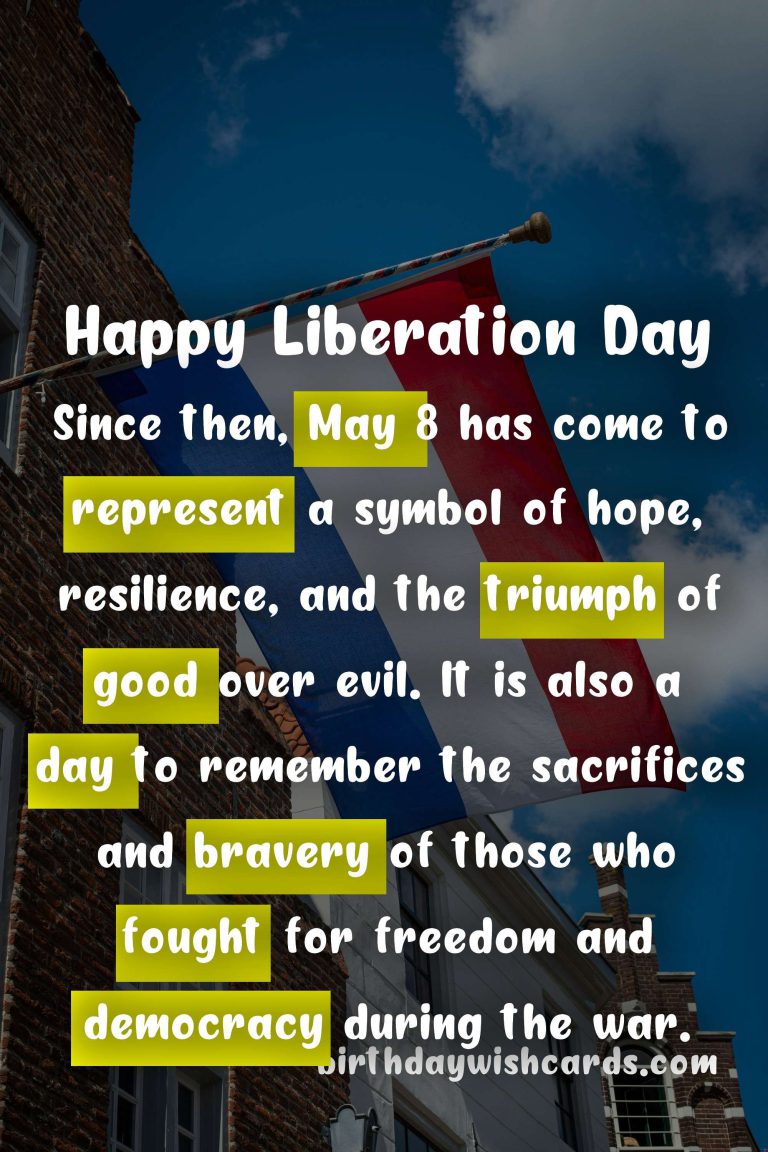
May 8: Liberation Day – Celebrating Freedom and Remembrance
May 8 is a profoundly significant date in global history, marking the anniversary of Liberation Day. Internationally recognized, this day stands as a powerful symbol of triumph, resilience, and the enduring pursuit of freedom. For millions around the world, it serves as a reminder of the sacrifices made in the fight for liberation and peace—from the end of World War II to ongoing struggles for independence. May 8 embodies the unwavering human spirit in overcoming oppression and adversity.
The Historical Significance of May 8, 1945
On May 8, 1945, the world witnessed a momentous occasion: the unconditional surrender of Nazi Germany, which brought World War II in Europe to an end. This turning point in history symbolized the liberation of millions who had suffered under the brutal tyranny of the Nazi regime. The conclusion of this devastating conflict paved the way for peace, reconstruction, and a renewed global commitment to human rights and democracy.
Since that landmark day, May 8 has become a global emblem of hope and the triumph of good over evil. It is not only a celebration of victory but also a solemn day of remembrance—honoring the bravery and sacrifices of those who fought to restore freedom and democracy during one of humanity’s darkest chapters.
Liberation Day Around the World
While May 8 is most closely associated with the end of World War II, its significance extends far beyond this event. Many nations observe Liberation Day as a tribute to their own struggles and journeys toward freedom.
- The Netherlands: Liberation Day commemorates the end of Nazi occupation and the restoration of Dutch independence. The day is celebrated with vibrant public events, parades, and cultural festivities.
- The Czech Republic: May 8 marks not only the end of World War II but also the collapse of oppressive regimes, symbolizing a new era of freedom and democracy.
Other countries also observe similar anniversaries, each reflecting on their unique histories of liberation and sovereignty.
How Liberation Day Is Celebrated
Across the globe, May 8 is marked by a variety of commemorative events that unite communities in both celebration and reflection. Streets come alive with parades, music, and colorful festivities as people express gratitude for freedom and show solidarity with those still striving for it.
Though the specific themes of Liberation Day celebrations vary by country, they share a common purpose: honoring the heroes of the past and ensuring their sacrifices are never forgotten. These events provide opportunities for education, remembrance, and the promotion of peace and unity.
The Importance of Remembrance on Liberation Day
One of the most profound aspects of Liberation Day is its focus on remembrance. It is a time to reflect on the atrocities of war, the cost of tyranny, and the enduring importance of peace. Memorial services and educational programs are often held to teach younger generations about the horrors of wartime and the value of freedom.
Remembering the past is essential to preventing history from repeating itself. By honoring those who suffered and sacrificed, societies reaffirm their commitment to upholding human rights and fostering a culture of tolerance and understanding.
Global Commitment to Freedom and Human Rights
May 8 also serves as a global call to action. On this day, nations renew their dedication to promoting tolerance, respect for human rights, and peaceful coexistence. Liberation Day is a poignant reminder that freedom is not guaranteed—it must be actively protected and preserved.
For more historical context on World War II and its aftermath, visit the History Channel’s overview of V-E Day.
The Ongoing Fight for Liberation
While Liberation Day commemorates past victories, it also highlights ongoing struggles for freedom around the world. In many regions, people continue to face discrimination, oppression, and violence. The spirit of Liberation Day calls on us to stand in solidarity with those still fighting for justice and to support efforts that advance true liberation and equality for all.
International organizations such as the United Nations Human Rights Office work tirelessly to promote human rights and combat oppression worldwide, embodying the very principles celebrated on Liberation Day.
Conclusion: Honoring the Past, Inspiring the Future
May 8 is both a celebration and a day of solemn remembrance. It honors the triumph of good over evil and pays tribute to the countless individuals who have fought—and continue to fight—for freedom and peace. Their sacrifices remind us to cherish our liberties and inspire us to work toward a more just and equitable world.
As we observe Liberation Day, let us commit to learning from history, standing against oppression in all its forms, and striving for a future where everyone can experience the true meaning of liberation.
